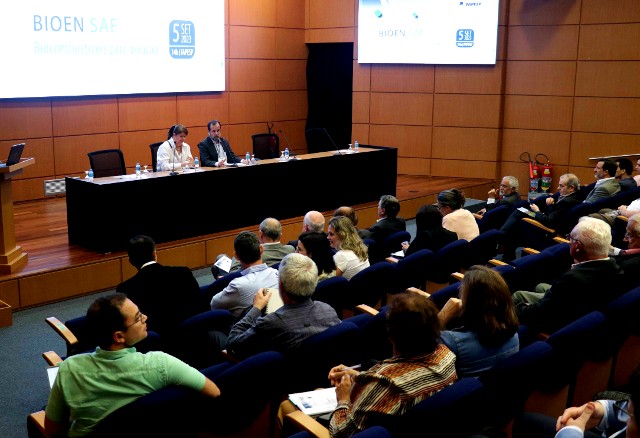


Glaucia Souza and Carlos Graeff during the seminar opening (photo: Felipe Maeda/Agência FAPESP)
Published on 09/25/2023
By José Tadeu Arantes | Agência FAPESP – Aviation accounts for 2% to 3% of global greenhouse gas emissions. For the planet to reach net zero (emissions minus removal) by 2050, as promised by the Paris Agreement, the sector must substantially reduce its carbon footprint. According to a report published by the International Energy Agency (IEA), “the currently rising level of emissions will have to be lowered to less than 1,000 megatonnes of CO2 [carbon dioxide] by 2030”. One way to do this is via rapid substitution of sustainable aviation fuels (SAFs) for fossil fuels.
To discuss the challenges and opportunities faced by the sector as well as research needs and potential partnerships, focusing specifically on biofuels for aviation, the steering committee for the FAPESP Bioenergy Research Program (BIOEN) hosted a seminar entitled BIOEN SAF Biofuels for Aviation on September 5, 2023, with one panel on technologies and production potential, and another on regulation, sustainability and usage.
The first session was moderated by Rubens Maciel Filho and Luis Fernando Cassinelli. The other participants were Fernando Ramada Castro (C.B. & Associates), Camilo Abduch Adas (Be8) and Luciane Chiodi (Agroicone).
Among the issues discussed by the panel was technological routes for production of SAFs. For Ramada Castro, promising options include hydroprocessing of vegetable oils, whose molecules are chemically similar to those of petroleum hydrocarbons, which is an advantage from the operational standpoint. “Palm oil would be the best SAF feedstock. First, because it doesn’t form gum and doesn’t require degumming. Second, because its molecular chain is the closest to SAF’s. Third, because it has the smallest number of double bonds and therefore requires less hydrogen to be processed,” he said.
Another advantage, which was described during the discussion, is that palm trees can be planted on areas of degraded pasture, of which Brazil has a very large amount so that significant expansion of palm tree plantations would not necessitate deforestation.
Chiodi spoke about the need for federal and state government incentives to foster this transition, and Adas stressed the importance of an integrated approach to focus on the whole instead of isolating any one variable. Sustainability should be grounded in environmental, economic and social factors.
In the second session, Symone Araújo, director of the Brazilian National Agency for Petroleum, Natural Gas and Biofuels (ANP), explained that as the head of the body responsible for assuring fuel quality and supply, her mission was to protect Brazilian consumers, “especially those who are unable to join forces in associations”. ANP, she added, must also defend low-income women, who manage 48% of Brazilian households and are the first to be affected by energy poverty. “Our role is to guarantee that the energy transition is fair, inclusive and mutually supportive. Otherwise, we’ll just be reinforcing the previous models, where advances in technology left people behind,” she said.
The second panel also featured Otávio Cavalett (Boeing), Marjorie Mendes Guarenghi (Agroicone) and Marcelo de Freitas Gonçalves (Embraer). It was moderated by Luiz Horta Nogueira and Joaquim Eugênio Seabra.
Guarenghi highlighted the importance of the role Brazil can play in international negotiations and the need for synergy with other emerging-market countries. Cavalett and Gonçalves stressed the need for rapid incorporation of SAF technology into the aircraft and engines now being built. Gonçalves recalled an obvious fact that is often overlooked: you do not trade in aircraft for new models every year or two as you do with cars. An aircraft built now will fly for the next 30 years, and unless it uses sustainable fuel, it will increase greenhouse gas emissions for that length of time. Its working life will last until after 2050, the deadline for the planet to reach net zero emissions.
The seminar was opened by Carlos Graeff, representing FAPESP’s Scientific Director, Marcio de Castro Silva Filho, and Glaucia Mendes Souza, a member of BIOEN’s steering committee. Graeff noted that FAPESP has supported more than 1,000 bioenergy research projects to date, and Souza outlined the program’s strategic plan for the decade 2020-30, which includes expanding the number of biomass sources.
A recording of the event BIOEN SAF Biofuels for Aviation is at: fapesp.br/16261.
Source: https://agencia.fapesp.br/44931